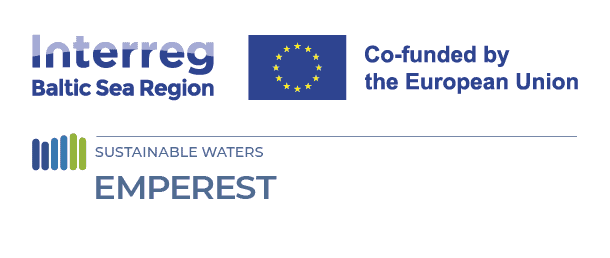
EMPEREST is testing PFAS solutions for practitioners, cities, and the region
17 June 2024
EMPEREST? PFAS? First time I hear about them!
No worries, but you better prepare for a deep dive into one of the recently identified main threats to the Baltic Sea ecosystem! We talk about PFAS and other organic micropollutants in water and wastewater.
Even outside of the professional water sector, the abbreviation “PFAS” is already quite wide-spread: these “forever chemicals”, which are known for their water-repellent qualities, are simultaneously polluting the water and all its related ecosystem, including soil, air, and living organisms like me and you, the reader.
PFAS (per- and polyfluoroalkyl substances) discharge management is one of the most pressing environmental challenges in the Baltic Sea region and globally. As pointed out in the latest holistic assessment of the Baltic Sea (HOLAS 3), hazardous substances in general are now being the main driver behind the Baltic Sea’s poor environmental status. Preparing to tackle this challenge (one step at a time), the EMPEREST project under the lead of the Union of the Baltic Cities Sustainable Cities Commission formed a consortium with 14 partners representing key stakeholders to address it, and the work has begun in January 2023.
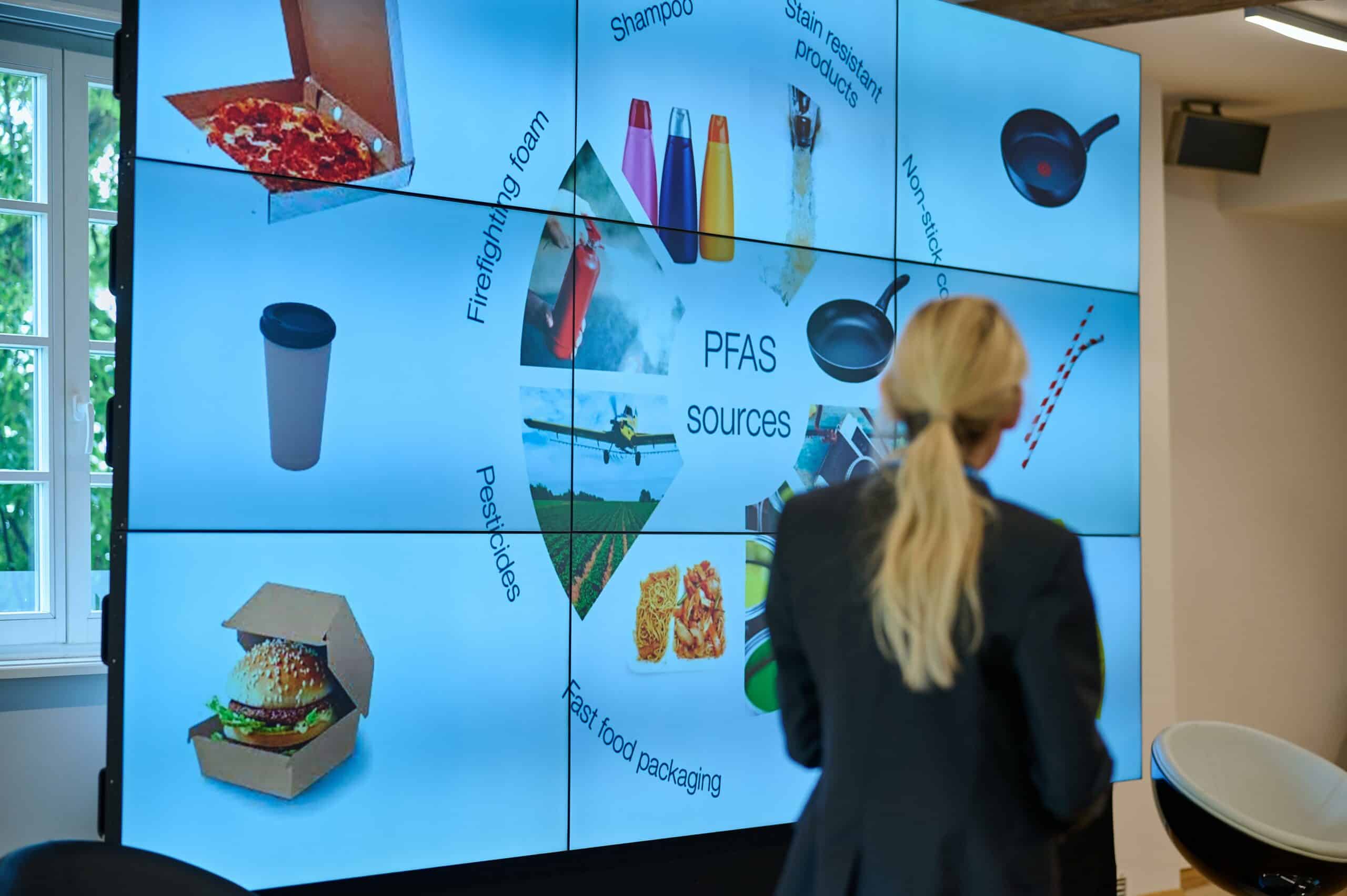
Given the intricate nature of this challenge, EMPEREST adopts a holistic approach, engaging a diverse array of target groups in our work. In collaboration with HELCOM, and bolstered by their network of national experts, we develop regional strategies for monitoring and assessment. We explore technological advancements in wastewater treatment alongside practitioners, aiming to identify the most effective and cost-efficient sequence of technologies for micropollutant removal. In partnership with municipalities, we establish a risk assessment framework that empowers local administration experts to initiate the process of identifying PFAS risk areas. Furthermore, we devise a comprehensive training package for water experts in cities and water utilities, aligning the newly available technologies and knowledge with the skill sets of employees.
And now let’s see what we have achieved so far in each of these ambitions!
Regional PFAS monitoring is supported with data and knowledge
The work done on the local level is crucial for protecting and improving the state of the Baltic Sea – but all local processes are different from each other, leaving a significant knowledge gap on the regional level. When we investigate the monitoring of PFAS presence in the environment, there are many different substances, matrices, and largely varied assessment parameters to consider. To address this gap, EMPEREST project partner HELCOM has developed draft regional methodological recommendations for the monitoring and assessment of PFAS in the aquatic environment – mainly the marine environment of the Baltic Sea, with some additional data for inland waters. The approach is based on the latest developments in the assessment of PFAS, especially the proposed sum of 24 PFAS proposal currently discussed within the EU, combined with a summary analysis of PFAS monitoring data from the Baltic Sea region from 2000-2022, collected through a data call carried out in 2023.
“With increased knowledge of PFAS toxicity there is a new EU proposal for the environmental quality values of a group of PFAS substances,” explains Markus Raudkivi, Project Coordinator at HELCOM – Baltic Marine Environment Protection Commission. “We have collected more than 150 000 data points for PFAS monitoring in the Baltic Sea region, and were able to conclude a thorough preliminary assessment. Using this new approach shows us an alarming picture: biota samples are on average more than 100-1000 times over the proposed threshold.”
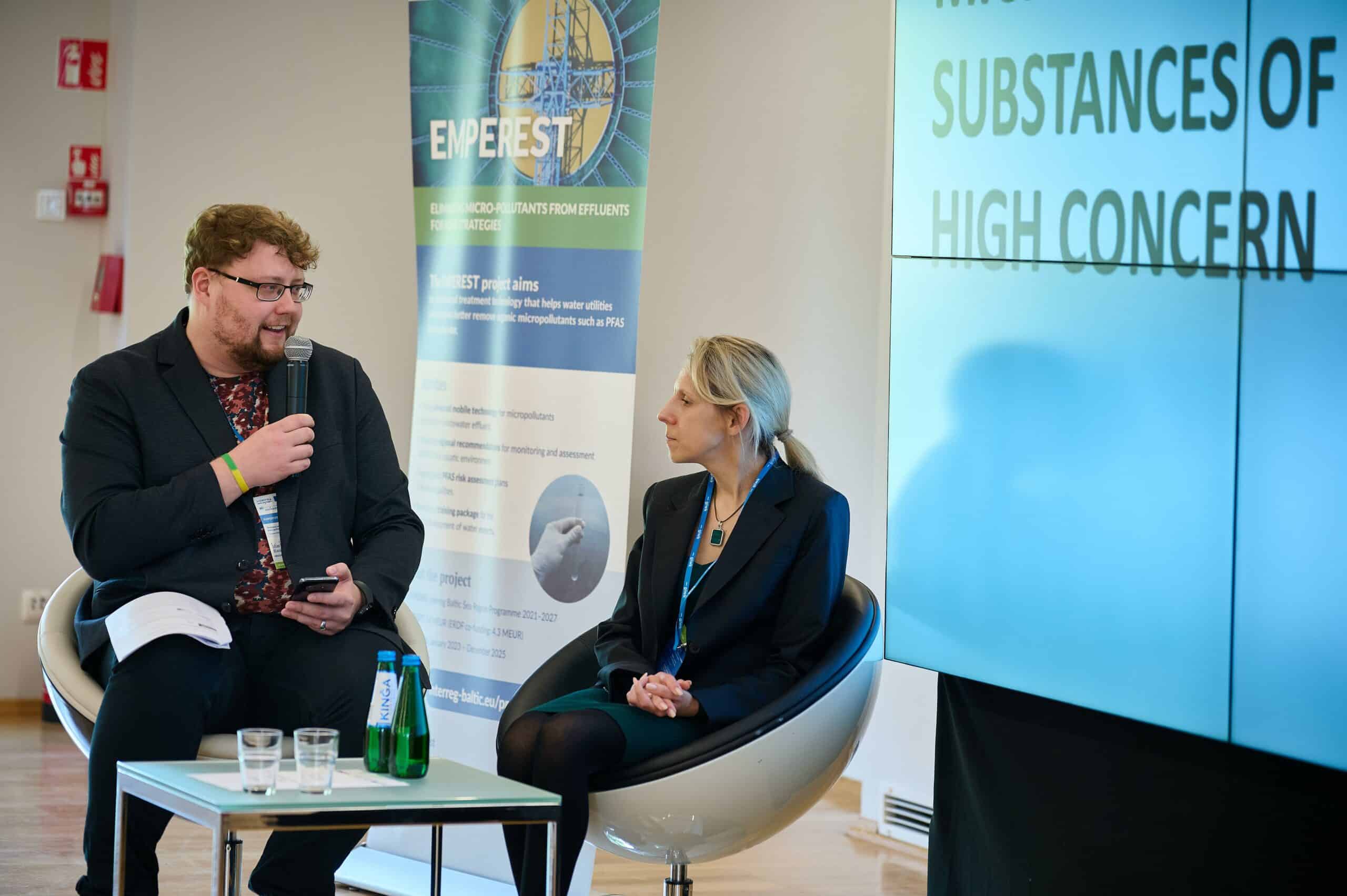
On the photo: Markus Raudkivi (on the left) moderating a panel discussion at the EMPEREST international workshop.
For regional-level methodological recommendations, it is vital to ensure that they are clear, relevant, and accepted by all countries cooperating in the Baltic Sea region. Therefore, right now these PFAS monitoring recommendations are discussed within the respective HELCOM working group as well as together with the national-level experts to fine-tune them further.
The draft recommendations were finalised in April 2024, and their validation will continue throughout the year leading to the publishing of the revised document.
“We are currently developing in HELCOM several regional level tools for addressing more holistically the substances that are hazardous for the marine environment, and also the Baltic Sea monitoring and assessment framework is continuously improved,” shares Lotta Ruokanen, Professional Secretary at HELCOM. “The data analysed and draft methodological recommendations from the EMPEREST project facilitate a crucial step forward in these work strands and have also induced concerned discussion among the regional expert and policymaker community.”
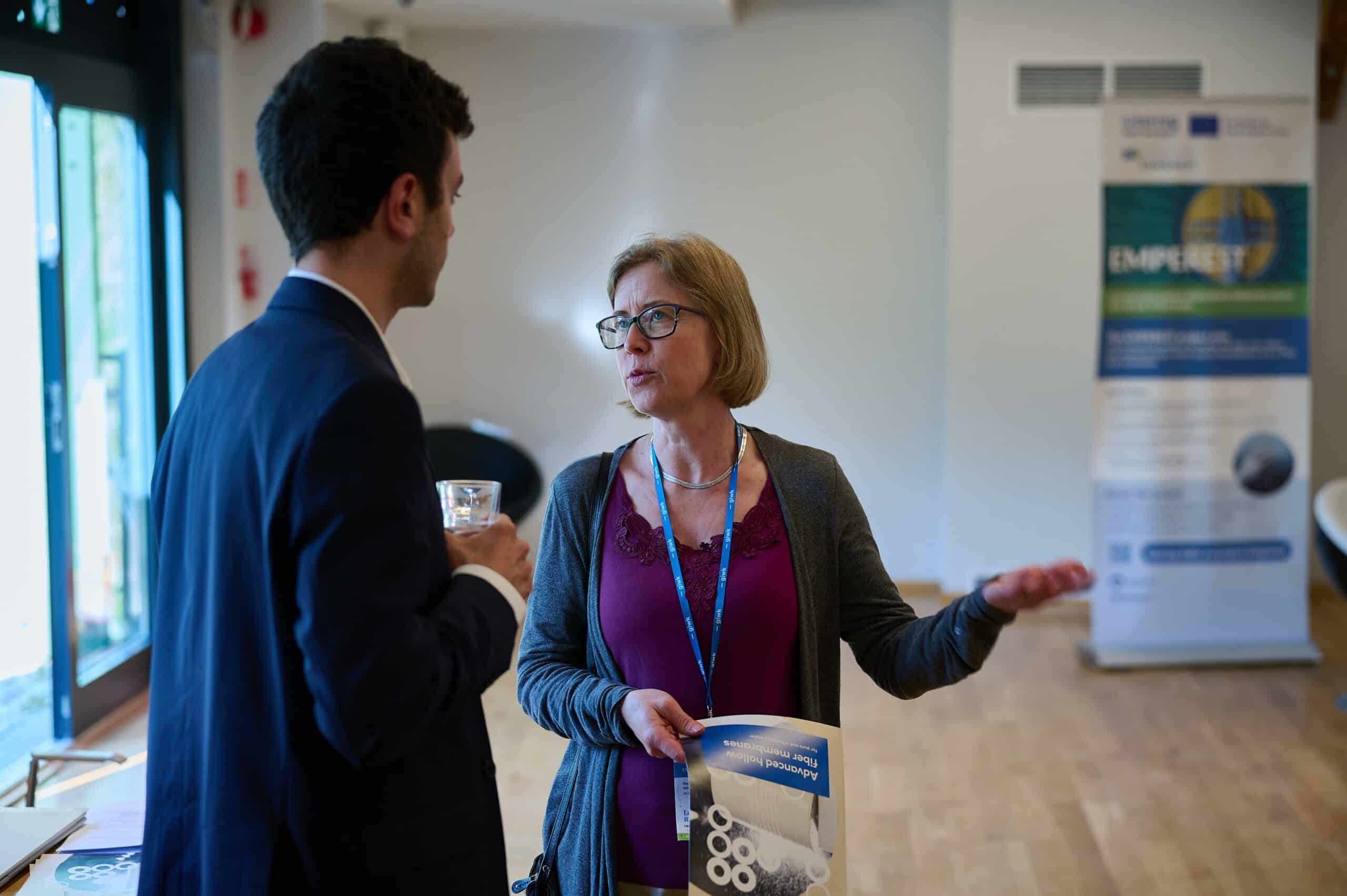
On the photo: Lotta Ruokanen at the EMPEREST international workshop.
PFAS risk assessment framework is developed with cities in BSR
It could be tempting to leave the challenge of PFAS and micropollutants for the wastewater treatment to solve – but that would hardly be a sustainable and comprehensive solution. It is always important to look into the upstream measures for potential pollution sites: not only as a way to lower the potentially extreme future treatment costs, but also to establish better dialogue, understanding and trust with the local producers and industries. In EMPEREST, the largely unexplored PFAS-elimination path for the local authorities is being paved by the Riga team, consisting of the representatives from the city, water company and research.
EMPEREST will equip the region with a PFAS risk assessment tool, which will help mapping PFAS pollution sources in the city. The PFAS risk assessment approach for local authorities will expand the local authorities’ understanding of the environmental risks posed by PFAS and encourage establishing preventive solutions and managing PFAS risks.
“EMPEREST project partners are developing solutions for highlighted challenges in the updated Urban Wastewater Treatment Directive to prevent pollution from non-domestic wastewater discharges at source, released from industries or enterprises connected to collecting systems,” emphasizes Maris Zviedris, Head of WWTP Riga Water. “Every stakeholder should develop understating about micropollutants, come to dialogue and develop pollution preventing system.”

On the photo: Maris Zviedris at the EMPEREST international workshop.
The draft framework for the local PFAS risk assessment plan is ready in June 2024, already after a series of consultations and workshops with several BSR municipalities and other stakeholders. The testing and further development of the risk assessment tool with different BSR cities will continue for another year – and result in not only the finalised risk assessment framework, but also in concrete plants elaborated in the contexts of at least 5 municipalities.
Mobile pilot containers are testing technologies to remove micropollutants
EMPEREST work is ongoing in the times of the expected significant changes of the regulations – for instance, the revision of the Urban Wastewater Treatment Directive. In early 2024, the EU has reached a provisional agreement on the new UWWTD to put on track the ambition for the zero-pollution Europe, particularly in respect to micropollutants.
Although the agreed timelines for the new thresholds for quaternary treatment (the removal of a broad spectrum of micropollutants) might not seem immediate, already by 2045, Member states will have to ensure the application of the new treatment steps in larger plants of 150 000 PE and above. The ambition of EMPEREST is to smoothen the process of preparing for such large infrastructural investments and allow WWTPs to find the most suitable sequence of effective quaternary treatment technologies through the series of tests in the mobile pilot containers. The work on this is led by the University of Tartu together with 6 WWTPs testing the technology and contributing to the work with data and experiences.
“In the realm of quaternary wastewater treatment, we navigate a delicate balance between understanding the nuances of micropollutants, quantifying minuscule concentrations, and meeting stringent EU discharge standards,” points out Taavo Tenno, Associated Professor at the University of Tartu. “As we explore sorption, filtration, and destruction technologies, our mission is clear: guide decision-makers toward cleaner water solutions.”
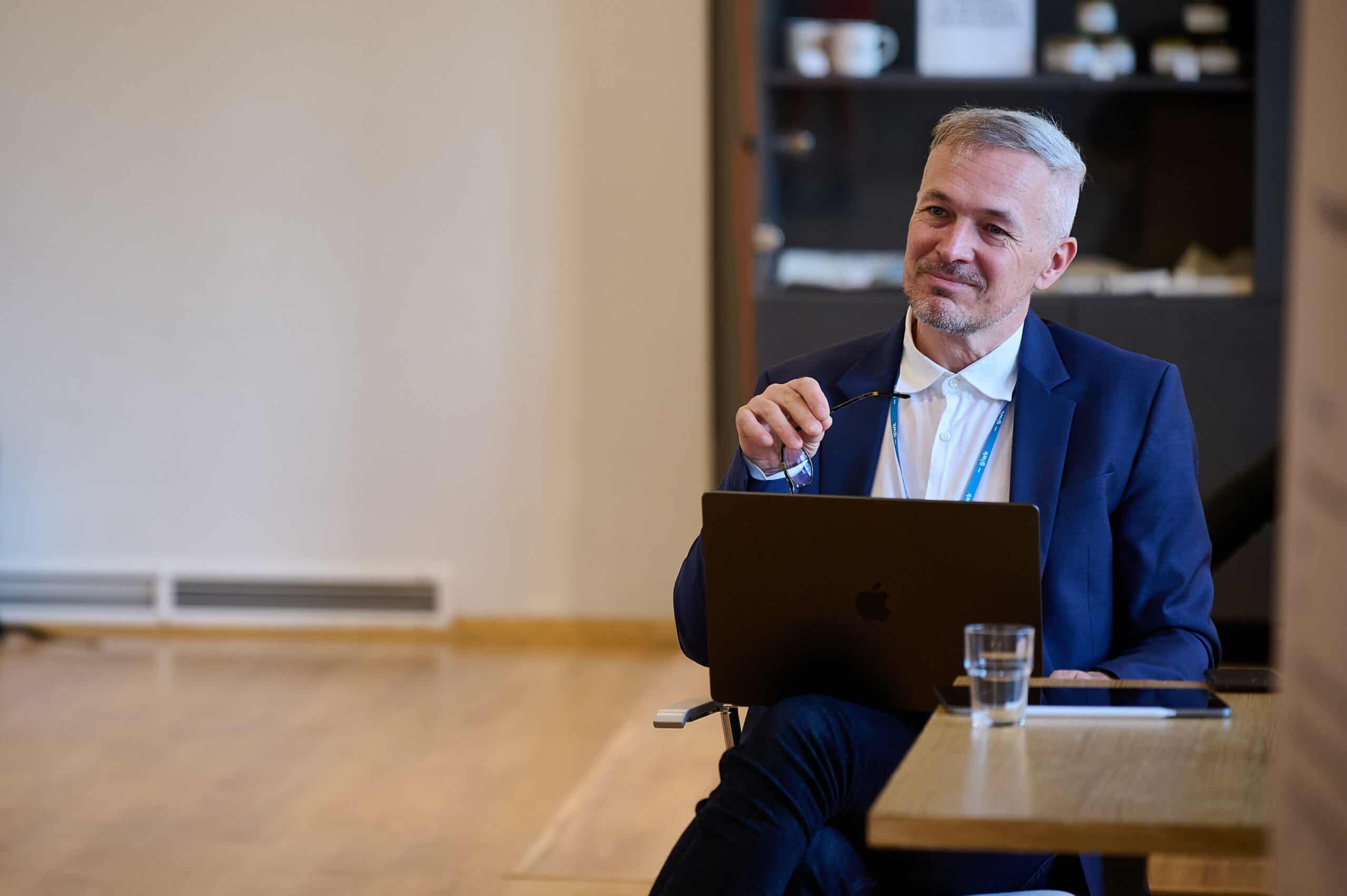
On the photo: Taavo Tenno at the EMPEREST international workshop.
How mobile are our containers? Almost like the extreme mobility of some of the addressed micropollutants! EMPEREST has procured two pilot containers, one in Tartu and another in Gdansk, and each of them will be tested at three wastewater treatment plants (at least within the project, but there is also significant interest from the plants external to the consortium!). The container at Tartu WWTP has already taken first samples from the mobile pilot – and after an operation period of several months, the pilot plant will travel to Tallinn and then to Turku for more local tests. Respectively, another container has started testing the water in Gdansk WWTP, after which it will be transferred to Szczecin and then Kaunas.
Training package is prepared for local authorities and public service providers
There is a huge amount of knowledge generated in EMPEREST – how to make sure that the public servants and practitioners develop their capacities accordingly with the changes happening right now? Prepared to answer this, our project partner Technical University of Berlin develops an interactive digital training package for both local authorities and service providers in the water and wastewater sectors, but also for anyone interested in the topic.
The conceptual framework of the training material was finalised at the end of the last year. Based on expert knowledge of PFAS and on presentations and interviews of experts in EMPEREST but also external events, training material is being developed. Five main thematic areas will be covered by the training material: Intro to PFAS; Environmental monitoring; PFAS risk assessment; PFAS and other micropollutants removal in wastewater treatment; Pilot cases in the frame of project EMPEREST. To ensure its transferability and increase its outreach, the training package will be hosted on the online platform Baltic Smart Water Hub showcasing the excellence of the water community in the Baltic Sea region.
“There is a lot of information about PFAS, and new knowledge is constantly generated,” highlights Nikolaos Tzoupanos, Department Urban of Water Management, Technical University of Berlin. “We are collecting, filtering, adapting, updating and presenting it in a user-friendly way, so anyone can be aware of the PFAS issue, either at beginner’s or at expert’s level.”
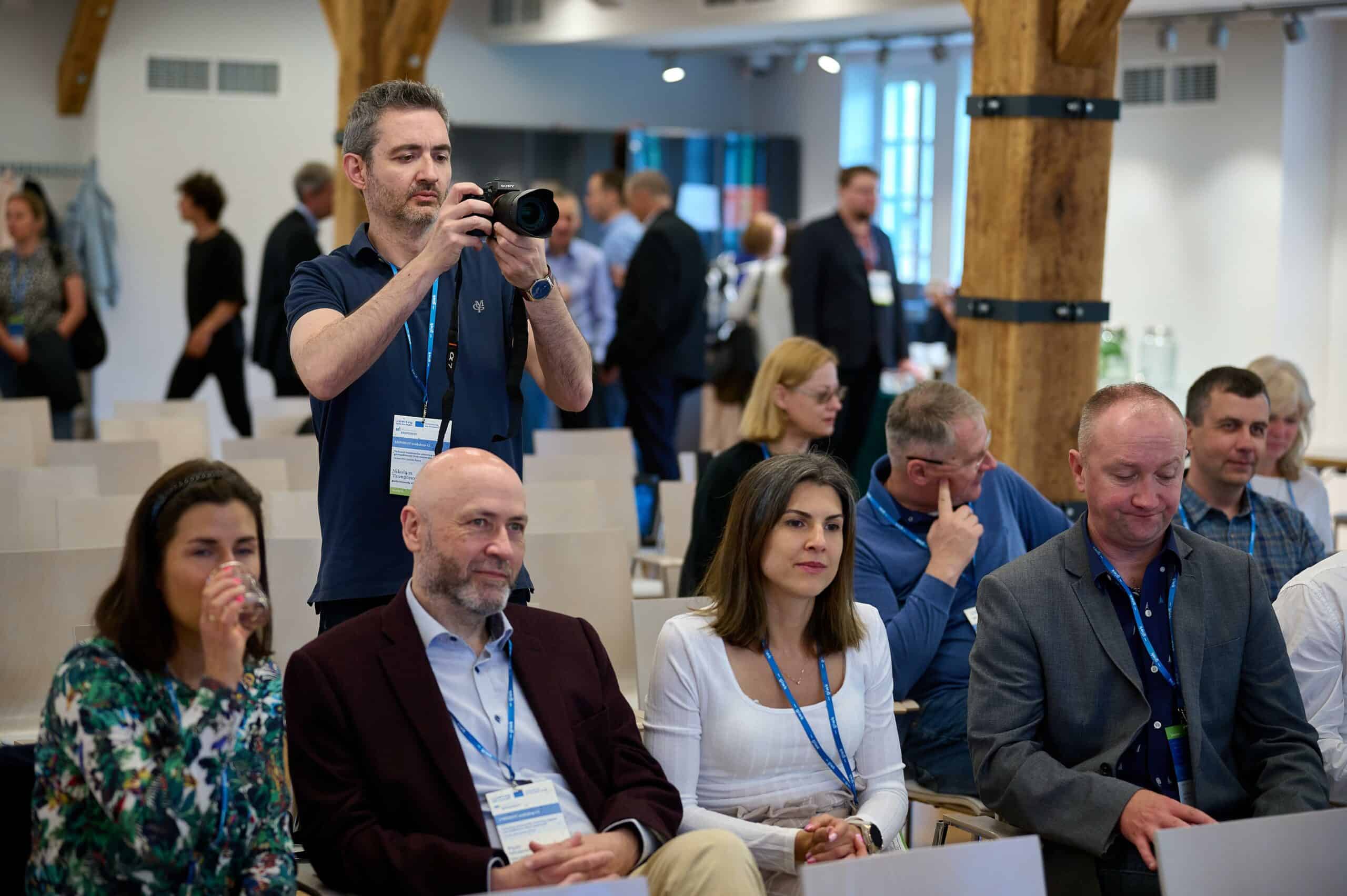
On the photo: Nikolaos Tzoupanos filming the presentations for the EMPEREST training package.
And finally, the time has come: during the 3rd period of the EMPEREST project, a part of the training material has been released for testing! Short videos covering the properties, production and use, releases to the environment and emerging health and environmental issues of PFAS were prepared and shared with project partners and external parties to collect their feedback. A survey was conducted to find out their opinion on the short videos prepared for the training package, and the results are now being evaluated and taken into consideration in its further development.
The first parts of the package will be gradually launched in the Water Hub later this year, and the full collection of training materials will be available online for all regional experts by mid-2025. The planning of the promotional campaign and of the capacity building actions based on the training material has already begun. You will hear more from EMPEREST, as the promotional campaign will commence to raise awareness about PFAS and motivate local experts to act, equipped with new knowledge and developed tools!
Stay tuned for what’s coming next in EMPEREST!
Written by: Mariia Andreeva (UBC Sustainable Cities Commission), together with Markus Raudkivi (HELCOM), Lotta Ruokanen (HELCOM), Maris Zviedris (Riga WWTP), Taavo Tenno (UT), and Nikolaos Tzoupanos (TUB).
Photos: Gdansk Water Utilities (GIWK)





